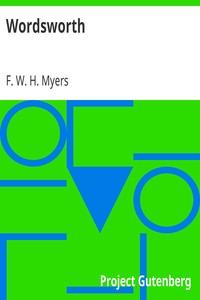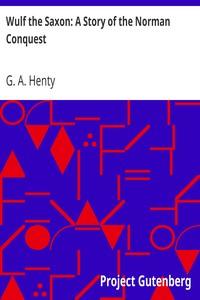Read this ebook for free! No credit card needed, absolutely nothing to pay.
Words: 56210 in 12 pages
This is an ebook sharing website. You can read the uploaded ebooks for free here. No credit cards needed, nothing to pay. If you want to own a digital copy of the ebook, or want to read offline with your favorite ebook-reader, then you can choose to buy and download the ebook.


: Wordsworth by Myers F W H Frederic William Henry - Poets English 19th century Biography; Wordsworth William 1770-1850
BIRTH AND EDUCATION--CAMBRIDGE.
I cannot, perhaps, more fitly begin this short biography than with some words in which its subject has expressed his own feelings as to the spirit in which such a task should be approached. "Silence," says Wordsworth, "is a privilege of the grave, a right of the departed: let him, therefore, who infringes that right by speaking publicly of, for, or against, those who cannot speak for themselves, take heed that he opens not his mouth without a sufficient sanction. Only to philosophy enlightened by the affections does it belong justly to estimate the claims of the deceased on the one hand, and of the present age and future generations on the other, and to strike a balance between them. Such philosophy runs a risk of becoming extinct among us, if the coarse intrusions into the recesses, the gross breaches upon the sanctities, of domestic life, to which we have lately been more and more accustomed, are to be regarded as indications of a vigorous state of public feeling. The wise and good respect, as one of the noblest characteristics of Englishmen, that jealousy of familiar approach which, while it contributes to the maintenance of private dignity, is one of the most efficacious guardians of rational public freedom."
In accordance with these views the poet entrusted to his nephew, the late Bishop of Lincoln, the task of composing memoirs of his life, in the just confidence that nothing would by such hands be given to the world which was inconsistent with the dignity either of the living or of the dead. From those memoirs the facts contained in the present work have been for the most part drawn. It has, however, been my fortune, through hereditary friendships, to have access to many manuscript letters and much oral tradition bearing upon the poet's private life; and some details and some passages of letters hitherto unpublished, will appear in these pages. It would seem, however, that there is but little of public interest, in Wordsworth's life which has not already been given to the world, and I have shrunk from narrating such minor personal incidents as he would himself have thought it needless to dwell upon. I have endeavoured, in short, to write as though the Subject of this biography were himself its Auditor, listening, indeed, from some region where all of truth is discerned, and nothing but truth desired, but checking by his venerable presence, any such revelation as public advantage does not call for, and private delicacy would condemn.
As regards the critical remarks which these pages contain. I have only to say that I have carefully consulted such notices of the poet as his personal friends have left us, and also, I believe, nearly every criticism of importance which has appeared on his works. I find with pleasure that a considerable agreement of opinion exists,-- though less among professed poets or critics, than among men of eminence in other departments of thought or action whose attention has been directed to Wordsworth's poems. And although I have felt it right to express in each case my own views with exactness, I have been able to feel that I am not obtruding on the reader any merely fanciful estimate in which better accredited judges would refuse to concur.
Without further preface I now begin my story of Wordsworth's life, in words which he himself dictated to his intended biographer. "I was born," he said, "at Cockermouth, in Cumberland, on April 7th, 1770, the second son of John Wordsworth, attorney-at-law--as lawyers of this class were then called--and law-agent to Sir James Lowther, afterwards Earl of Lonsdale. My mother was Anne, only daughter of William Cookson, mercer, of Penrith, and of Dorothy, born Crackanthorp, of the ancient family of that name, who from the times of Edward the Third had lived in Newbiggen Hall, Westmoreland. My grandfather was the first of the name of Wordsworth who came into Westmoreland, where he purchased the small estate of Sockbridge. He was descended from a family who had been settled at Peniston, in Yorkshire, near the sources of the Don, probably before the Norman Conquest. Their names appear on different occasions in all the transactions, personal and public, connected with that parish; and I possess, through the kindness of Colonel Beaumont, an almery, made in 1525, at the expense of a William Wordsworth, as is expressed in a Latin inscription carved upon it, which carries the pedigree of the family back four generations from himself. The time of my infancy and early boyhood was passed, partly at Cockermouth, and partly with my mother's parents at Penrith, where my mother, in the year 1778, died of a decline, brought on by a cold, in consequence of being put, at a friend's house in London, in what used to be called 'a best bedroom.' My father never recovered his usual cheerfulness of mind after this loss, and died when I was in my fourteenth year, a schoolboy, just returned from Hawkshead, whither I had been sent with my elder brother Richard, in my ninth year."
"I remember my mother only in some few situations, one of which was her pinning a nosegay to my breast, when I was going to say the catechism in the church, as was customary before Easter. An intimate friend of hers told me that she once said to her, that the only one of her five children about whose future life she was anxious was William; and he, she said, would be remarkable, either for good or for evil. The cause of this was, that I was of a stiff, moody, and violent temper; so much so that I remember going once into the attics of my grandfather's house at Penrith, upon some indignity having been put upon me, with an intention of destroying myself with one of the foils, which I knew was kept there. I took the foil in hand, but my heart failed. Upon another occasion, while I was at my grandfather's house at Penrith, along with my eldest brother, Richard, we were whipping tops together in the large drawing-room, on which the carpet was only laid down upon particular occasions. The walls were hung round with family pictures, and I said to my brother, 'Dare you strike your whip through that old lady's petticoat?' He replied, 'No, I won't.' 'Then', said I, 'here goes!' and I struck my lash through her hooped petticoat; for which, no doubt, though I have forgotten it, I was properly punished. But, possibly from some want of judgment in punishments inflicted, I had become perverse and obstinate in defying chastisement, and rather proud of it than otherwise."
But it was not from exercises of this kind that Wordsworth's school-days drew their inspiration. No years of his life, perhaps, were richer in strong impressions; but they were impressions derived neither from books nor from companions, but from the majesty and loveliness of the scenes around him;--from Nature, his life-long mistress, loved with the first heats of youth. To her influence we shall again recur; it will be most convenient first to trace Wordsworth's progress through the curriculum of ordinary education.
It was due to the liberality of Wordsworth's two uncles, Richard Wordsworth and Christopher Crackanthorp , that his education was prolonged beyond his school-days. For Sir James Lowther, afterwards Lord Lonsdale,--whose agent Wordsworth's father, Mr. John Wordsworth, was--becoming aware that his agent had about 5000? at the bank, and wishing, partly on political grounds, to make his power over him absolute, had forcibly borrowed this sum of him, and then refused to repay it. After Mr. John Wordsworth's death much of the remaining fortune which he left behind him was wasted in efforts to compel Lord Lonsdale to refund this sum; out it was never recovered till his death in 1801, when his successor repaid 8500? to the Wordsworths, being a full acquittal, with interest, of the original debt. The fortunes of the Wordsworth family were, therefore, at a low ebb in 1787, and much credit is due to the uncles who discerned the talents of William and Christopher, and bestowed a Cambridge education on the future Poet Laureate, and the future Master of Trinity.
In October, 1787, then, Wordsworth went up as an undergraduate to St. John's College, Cambridge. The first court of this College, in the south-western corner of which were Wordsworth's rooms, is divided only by a narrow lane from the Chapel of Trinity College, and his first memories are of the Trinity clock, telling the hours "twice over, with a male and female voice", of the pealing organ, and of the prospect when
From my pillow looking forth, by light Of moon or favouring stars I could behold The antechapel, where the statue stood Of Newton with his prism and silent face. The marble index of a mind for ever Voyaging through strange seas of Thought, alone.
To bless the place where, on their opening soul, First the genuine ardour stole.
"'Twas Milton struck the deep-toned shell," and invoked with the old affection the scenes which witnessed his best and early years:
Free books android app tbrJar TBR JAR Read Free books online gutenberg
More posts by @FreeBooks

: History of Modern Mathematics Mathematical Monographs No. 1 by Smith David Eugene - Mathematics History Mathematics


: Wulf the Saxon: A Story of the Norman Conquest by Henty G A George Alfred - Soldiers Juvenile fiction; Saxons Juvenile fiction; Normans Juvenile fiction; Great Britain History Norman period 1066-1154 Juvenile fiction Children's Fiction; Historical Fiction






